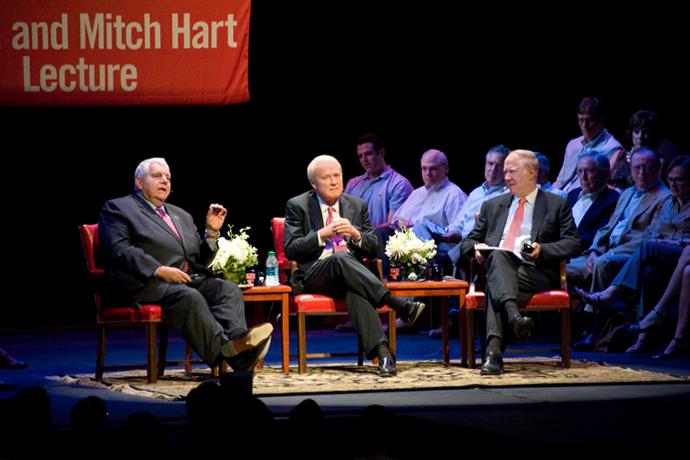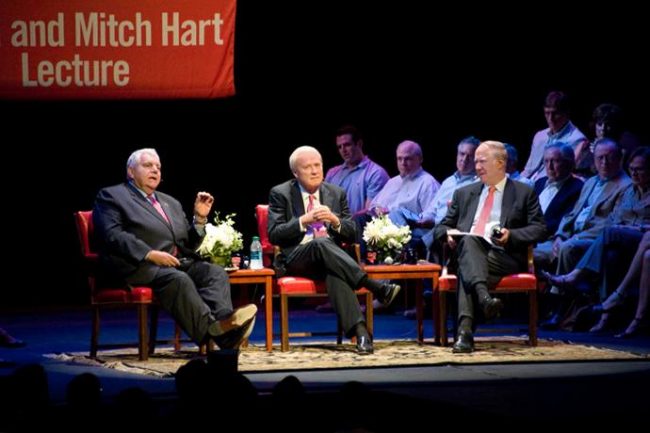
CNN political commentator William Bennett (left) and television host Chris Matthews (right) discussed the state of the economy and the upcoming presidential election as part of SMU’s Tate Lecture Series on Tuesday in McFarlin Auditorium. (Sidney Hollingsworth/The Daily Campus)
The thirty-first season of the Tate Lecture Series opened Tuesday night with a heated, riveting debate between two of the country’s most respected political commentators, William Bennett and Chris Matthews. The debate was moderated by former presidential advisor and CNN host David Gergen.
“You could definitely feel a different atmosphere from the normal Tate lectures,” senior Nicollete Bruce said.
She also said the atmosphere in McFarlin Auditorium was definitely more intense from both the crowd and the speakers on stage.
With the presidential election a mere eight weeks away, hearing representation from both parties brought the key election issues to the forefront.
The young adult population and its ability to turnout will be a key issue in the 2012 presidential election.
“I think bringing these speakers here…for the students to hear from a few months before they vote is really great.” Bruce said.
Gergen jumped right in asking tough questions of both Bennett and Matthews, not shying away from overt American concerns surrounding both candidates.
His discussion focused on likability, the economy, unemployment and social policy.
“[I’ve heard people say] Obama is America’s second choice, and Romney is America’s third choice.” Gergen said.
Bennett immediately made clear his outlook on the election’s possible outcome.
“I think Romney will win the election,” he said.
Matthews responded right back with the question on many American’s minds, asking in regards to Romney, “Does this person care about people like you?”
The initial question asked by Gergen set up the framework of the debate: Matthews on the political left and Bennett on the political right.
The recent national conventions – the Democratic National Convention in Charlotte and the Republic National Convention in Tampa Bay – found both candidates making promises of economic growth and reform without providing their actual plans of action.
Bennett defended Romney in this sense, accusing Obama of having lost the opportunity to follow through on his promises made back in 2008.
Obama’s campaign in 2008 was built around hope, change and reform, especially around the issues of education, healthcare and clean energy.
“There’s a difference between the guy proposing the plans and the guy who’s been President and has a record,” Bennett said.
But Matthews clearly took his stance against Romney as a viable candidate, saying he won the primaries “with a brilliant use of money” against competitors that lacked any chance in the first place.
Romney beat out Rick Santorum, a popular social conservative, and a string of other candidates for the Republican nomination.
“Who did Romney actually beat [in the primaries]? Nobody.”
Matthews went on to explain that Romney’s vagueness in his party’s platform means he’s “not answering the fundamental questions.”
“It’s not a complete presentation…that’s why he’s in trouble.”
Amidst the electric volley between Bennett and Matthews, Gergen intervened by questioning what President Obama would do with the economic crisis if elected for a second term.
“We have no clue, really, as to what Obama would do…because he hasn’t given it to us.” Bennett said.
It’s dynamic, two-sided debates like these that sophomore Alexander Hoskins calls “crucial” to the SMU environment.
“[As students,] all we have is the facts, the news…so much more was brought out of this debate than it could’ve been with one person up there giving a lecture.”
Hoskins says students need “a more clear picture of what’s going on” to really make educated decisions in today’s political world.
“We cannot grow if we cannot challenge our ideas.”










